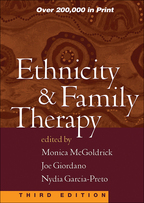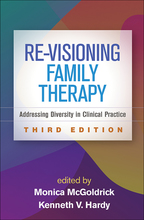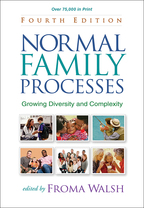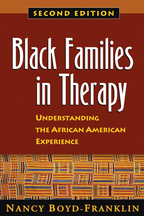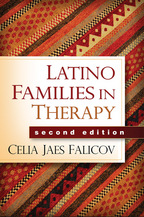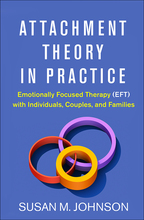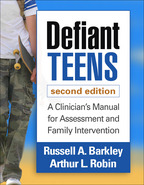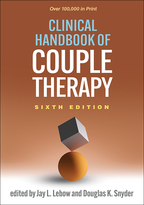Ethnicity and Family Therapy
Third Edition
Edited by Monica McGoldrick, Joe Giordano, and Nydia Garcia Preto
Hardcovere-bookprint + e-book
Hardcover
orderAugust 18, 2005
ISBN 9781593850203
Price: $130.00 796 Pages
Size: 7" x 10"
Sign up for emails on upcoming titles on Families & Couples (with special discounts)!
“The editors and contributors have made substantial changes in the content of the third edition, as evidenced by the expanded 'Overview' chapter that sets the tone of why ethnicity is so important for our work as family therapists....The editors have added 13 new chapters, with the bulk of these chapters focusing on Latino and Asian ethnicities. This is a welcome change, considering that the changing racial and ethnic demographics of the USA are primarily related to increased immigration from Latino, Asian, and Pacific Islander populations....Another welcome addition is the appendix on cultural assessment....Has the potential to influence all the different spheres of what it means to be a family therapist. It should be part of every family therapist's library.”

—Journal of Marital and Family Therapy
“Scholars, students, and everyone interested in diverse family patterns will welcome this engrossing, highly informative third edition of Ethnicity and Family Therapy. Major strengths of this book are the range of groups considered, a highly readable writing style, consistency of format throughout the chapters, extensive documentation, and the relevance of context covered to typical clinical situations....A treasured resource that can serve to help explain behavior patterns that are seemingly idiosyncratic yet that may be rooted in history and culture....As a textbook, Ethnicity and Family Therapy is especially relevant to courses in cultural and ethnic diversity and could serve as a supplement to family therapy courses.”

—Research on Social Work Practice
“An important resource....It is an authoritative and comprehensive reference that should be read by anyone who seeks cultural competence in providing therapy to families in the culturally diverse society of the contemporary United States.”

—The Family Psychologist
“This well-edited and comprehensive volume should prove to be of great value to psychotherapists of all orientations....Most specific chapters begin with historical accounts and cultural overviews. These informative materials will help any psychotherapist appreciate the factors affecting individual patients and families as they strive to accept and adjust to American societal expectations....Clinicians would be wise to keep a copy of this volume available for consultation to enhance their ability to provide culturally competent assessment and treatment.”

—American Journal of Psychiatry (on previous edition)
“The representation of additional ethnic groups is an important contribution of this compelling new edition. A clear reminder that cultural diversity is a fact of life, this book gives family therapists and other helping professionals a greater understanding of the histories, values, and expectations of the diverse families and individuals we encounter. Important themes resonate throughout, including the ways that religious and spiritual beliefs, historical circumstances, immigration histories, and experiences of racism and prejudice influence contemporary families' strengths and struggles. Every chapter is moving, unique, and highly useful.”

—Patricia Arredondo, EdD, Counseling/Counseling Psychology Program, Arizona State University; President (2005-2006), American Counseling Association
“Now in its third edition, Ethnicity and Family Therapy remains one of the essential textbooks for developing cultural competence in clinical practice. Unlike any other single book in the field, its 54 chapters provide the most comprehensive description of culture-related family issues relevant to mental health and health care. At the same time, this book wisely teaches us that our understanding of these cultural patterns must incorporate not only ethnicity, but also gender, socioeconomic status, geography, religion, race, and politics, among other factors. A 'must-have' tour de force for seasoned professionals and trainees alike.”

—Francis G. Lu, MD, Department of Psychiatry, University of California, San Francisco, and San Francisco General Hospital
“Ethnicity is part of the lived experience of each of us every day, whether in the foods we like, our ways of expressing affection, religious and political views, gender roles, taboos and expectations, and so much more. This book expands our understanding of the complexity of the cultural fabric of our families: what distinguishes us and what unites us. As we travel through a multiplicity of national, cultural, racial, and religious backgrounds, what is most remarkable is that across all of these diverse experiences and conditions, families are important to us all. This book allows us to celebrate our differences while encouraging us to conduct our clinical work with respect toward and knowledge of each family's ethnic and cultural uniqueness.”

—José Szapocznik, PhD, Center for Family Studies, Department of Psychiatry and Behavioral Sciences, University of Miami
“I have used Ethnicity and Family Therapy as a text for 12+ years in my master’s-level Cross-Cultural Counseling course. I have been impressed with the various editions of the text as a compendium of information regarding a broad cross-section of the human family. I have particularly enjoyed the increasing expansion of coverage, both within broad ethnic groups and across groups. This breadth deepens my students’ comprehension of the richness of human diversity and mitigates their tendencies to view members of different groups through monolithic lenses. This text has been invaluable in my approach to teaching about the nexus of person, problems, and treatment approaches.”

—Daryl M. Rowe, PhD, Graduate School of Education and Psychology, Pepperdine University
—Journal of Marital and Family Therapy
“Scholars, students, and everyone interested in diverse family patterns will welcome this engrossing, highly informative third edition of Ethnicity and Family Therapy. Major strengths of this book are the range of groups considered, a highly readable writing style, consistency of format throughout the chapters, extensive documentation, and the relevance of context covered to typical clinical situations....A treasured resource that can serve to help explain behavior patterns that are seemingly idiosyncratic yet that may be rooted in history and culture....As a textbook, Ethnicity and Family Therapy is especially relevant to courses in cultural and ethnic diversity and could serve as a supplement to family therapy courses.”
—Research on Social Work Practice
“An important resource....It is an authoritative and comprehensive reference that should be read by anyone who seeks cultural competence in providing therapy to families in the culturally diverse society of the contemporary United States.”
—The Family Psychologist
“This well-edited and comprehensive volume should prove to be of great value to psychotherapists of all orientations....Most specific chapters begin with historical accounts and cultural overviews. These informative materials will help any psychotherapist appreciate the factors affecting individual patients and families as they strive to accept and adjust to American societal expectations....Clinicians would be wise to keep a copy of this volume available for consultation to enhance their ability to provide culturally competent assessment and treatment.”
—American Journal of Psychiatry (on previous edition)
“The representation of additional ethnic groups is an important contribution of this compelling new edition. A clear reminder that cultural diversity is a fact of life, this book gives family therapists and other helping professionals a greater understanding of the histories, values, and expectations of the diverse families and individuals we encounter. Important themes resonate throughout, including the ways that religious and spiritual beliefs, historical circumstances, immigration histories, and experiences of racism and prejudice influence contemporary families' strengths and struggles. Every chapter is moving, unique, and highly useful.”
—Patricia Arredondo, EdD, Counseling/Counseling Psychology Program, Arizona State University; President (2005-2006), American Counseling Association
“Now in its third edition, Ethnicity and Family Therapy remains one of the essential textbooks for developing cultural competence in clinical practice. Unlike any other single book in the field, its 54 chapters provide the most comprehensive description of culture-related family issues relevant to mental health and health care. At the same time, this book wisely teaches us that our understanding of these cultural patterns must incorporate not only ethnicity, but also gender, socioeconomic status, geography, religion, race, and politics, among other factors. A 'must-have' tour de force for seasoned professionals and trainees alike.”
—Francis G. Lu, MD, Department of Psychiatry, University of California, San Francisco, and San Francisco General Hospital
“Ethnicity is part of the lived experience of each of us every day, whether in the foods we like, our ways of expressing affection, religious and political views, gender roles, taboos and expectations, and so much more. This book expands our understanding of the complexity of the cultural fabric of our families: what distinguishes us and what unites us. As we travel through a multiplicity of national, cultural, racial, and religious backgrounds, what is most remarkable is that across all of these diverse experiences and conditions, families are important to us all. This book allows us to celebrate our differences while encouraging us to conduct our clinical work with respect toward and knowledge of each family's ethnic and cultural uniqueness.”
—José Szapocznik, PhD, Center for Family Studies, Department of Psychiatry and Behavioral Sciences, University of Miami
“I have used Ethnicity and Family Therapy as a text for 12+ years in my master’s-level Cross-Cultural Counseling course. I have been impressed with the various editions of the text as a compendium of information regarding a broad cross-section of the human family. I have particularly enjoyed the increasing expansion of coverage, both within broad ethnic groups and across groups. This breadth deepens my students’ comprehension of the richness of human diversity and mitigates their tendencies to view members of different groups through monolithic lenses. This text has been invaluable in my approach to teaching about the nexus of person, problems, and treatment approaches.”
—Daryl M. Rowe, PhD, Graduate School of Education and Psychology, Pepperdine University

